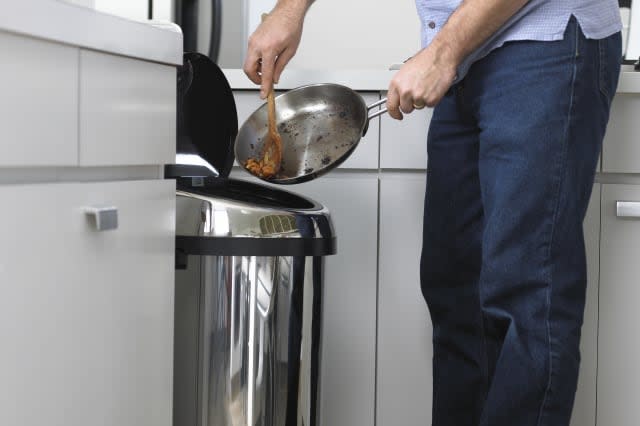Save £700 a year on groceries - by cutting out waste

Figures from the Love Food Hate Waste campaign have revealed that the average family with children wastes £700 a year on food that they end up throwing away. The study found that even households without kids waste £470 a year on wasted food. This includes a combined total of £2 billion of home-made meals, and comes to a shocking total of £12.5 billion a year.
It means that before any of us consider arguing that there's no way we can cut our costs, we need to take ten steps to dramatically reduce the amount of food we end up throwing away.
1. Start with a plan
Before we go anywhere near a supermarket, we need to plan our meals for the week. Plenty of people will argue that they're not organised enough, or that their life isn't predictable enough to stick with a plan. However, it doesn't mean we should give up altogether, because there are techniques that enable us to plan ahead, and yet cope with changes.
%VIRTUAL-ArticleSidebar-supermarkets%
2. Include flexible days in the plan
Have at least one day a week when you intend to eat from the store cupboard or the freezer. On any day when you don't end up eating what you had planned (if, for example, you end up eating out or being too tired to cook when you get home), you can reallocate the fresh food to the store cupboard day - so you still eat it up.
3. Check the cupboards
Once you know what you plan to eat for every meal, you need to check the fridge and the cupboards to see what you already have. It sounds obvious, but more than half of all shoppers head out without taking this simple step, and so they're far more likely to end up needlessly duplicating things, and throwing them away,
4. Look at shelf life when you're shopping
Take the time to check when fresh food needs to be used by. It's pointless buying chicken for a meal planned on Wednesday if it goes off on Tuesday. It's also worth looking towards the back of each shelf, as when they are being restocked, the items with the later use-by dates will be put at the back.
5. Resist special offers
If you find a great deal on fresh food, it can be tempting to snap it up without a second thought. However, if you cannot freeze it, and there's no room for it in your plan, you'll just end up throwing it away. A bogof deal is essentially completely valueless if you end up leaving one of the items to go off before throwing it away.
6. Buy less
In the supermarket, the temptation to load up the trolley is enormous. It's why researchers have found they can increase the quantities of food people buy simply by stocking larger trollies. If you take a list, you can make sure you stick to it, and don't start adding endless extras 'just in case'. You also need to beware of buying bigger packs. They can offer better value for money, but academic studies have shown that if we buy a bigger pack, we consume more, so think very carefully whether you have the self control to make that bigger pack last longer.
7. Check the fridge
You need to keep an eye on how fresh food is keeping. A quick look every day will show you whether the food is going to last as long as you need it to, or whether you need to freeze it, or cook it sooner than planned. If you make a habit of checking this every morning when you get the milk out for breakfast, you won't ever come across something brown and squashy in the vegetable drawer ever again.
8. Don't be too quick to throw food away
Many of us have become slaves to the 'best before' date, but this is just a suggestion from the person manufacturing or packaging the food, which means that after this date the food may not have quite the same flavour or texture. The key date is the 'use by' date - which is the one designed to show you when the food becomes dangerous to eat. If there is no 'use by' date, and you go a few days beyond the 'best before' date, then there's a very good chance you won't notice the difference.
9. Factor the freezer into your plan
There will be some food you might want to freeze on the day you buy it. This could include meat for later in the week, or bread if you've already got a loaf in the bread bin. The Love Food Hate Waste campaign says that £660 million of poultry and £640 million of pork products gets thrown away every year. If you freeze the meat on the day you buy it (leaving plenty of time for defrosting), then you can reduce that figure in your house to zero.
10. Think about leftovers
If you have unexpected leftovers, make a plan. You might want to switch it into the day when you planned to eat from the store cupboard, or freeze it for next week. Just don't leave it to go rotten in the fridge.
Shopping stories on AOL Money
Boost battery life by 800% for just £1.60
Aldi whisky takes top awards in prestigious awards alongside £75 bottles
Sainsbury's listed as cheapest supermarket for first time in 2015





